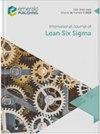How to assess and improve the triple bottom line (TBL) in manufacturing processes: a real case in home appliance manufacturing
IF 3.7
2区 工程技术
Q2 ENGINEERING, INDUSTRIAL
引用次数: 1
Abstract
Purpose This paper aims to propose a stepwise method to improve the sustainability of manufacturing processes. Design/methodology/approach The proposed approach is based on an extensive literature review and research around the environmental, economic and social pillars of sustainability in manufacturing firms. Considering the lean approach, the manufacturing processes are mapped in a value stream and analyzed through the extensive identified sustainability criteria. Findings The findings reveal the consumption and waste of natural and nonrenewable resources, through going beyond the existing boundaries and focusing on relevant derived production pieces and tracing to their origins. The findings also present the effect of the time value of money on sustainability by using the cost–time profile as a sustainability criterion. This research finds out the employees’ impacts on sustainability improvement through an effective focus on technical, cultural and personal aspects. Practical implications The research outcomes provide operations managers and decision-makers in the field of sustainability with a practical platform to comprehend and assess the factors contributing to the manufacturing process sustainability and to plan relevant corrective actions accordingly. Originality/value The extended view of sustainability criteria in this research as well as its visual-analytical approach will help practitioners to assess and improve sustainability in their operations in a more holistic way.如何评估和提高制造过程中的三重底线(TBL)——以家电制造为例
本文旨在提出一种逐步提高制造过程可持续性的方法。设计/方法/方法所提出的方法是基于广泛的文献综述和研究,围绕制造业企业可持续发展的环境、经济和社会支柱。考虑到精益方法,制造过程被映射到价值流中,并通过广泛确定的可持续性标准进行分析。调查结果通过超越现有边界,关注相关衍生产品并追溯其起源,揭示了自然和不可再生资源的消耗和浪费。研究结果还通过使用成本-时间概况作为可持续性标准,提出了货币的时间价值对可持续性的影响。本研究通过对技术、文化和个人方面的有效关注,发现了员工对可持续发展的影响。实际意义研究结果为可持续发展领域的运营经理和决策者提供了一个实用的平台,以理解和评估影响制造过程可持续性的因素,并相应地计划相关的纠正措施。本研究中可持续性标准的扩展观点及其视觉分析方法将有助于从业者以更全面的方式评估和改善其业务的可持续性。
本文章由计算机程序翻译,如有差异,请以英文原文为准。
求助全文
约1分钟内获得全文
求助全文
来源期刊

International Journal of Lean Six Sigma
Engineering-Industrial and Manufacturing Engineering
CiteScore
8.90
自引率
15.00%
发文量
46
期刊介绍:
Launched in 2010, International Journal of Lean Six Sigma publishes original, empirical and review papers, case studies and theoretical frameworks or models related to Lean and Six Sigma methodologies. High quality submissions are sought from academics, researchers, practitioners and leading management consultants from around the world. Research, case studies and examples can be cited from manufacturing, service and public sectors. This includes manufacturing, health, financial services, local government, education, professional services, IT Services, transport, etc.
 求助内容:
求助内容: 应助结果提醒方式:
应助结果提醒方式:


